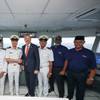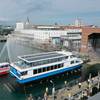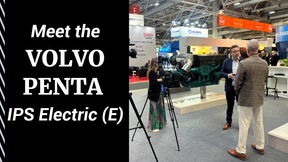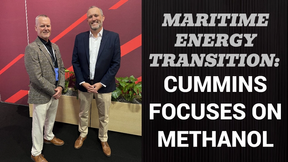Austal Delivers Ferry For Operation In Malta
Passengers boarding the new ferry will instantly be impressed by the high quality furnishings and décor that greets them when they first enter the ticketing foyer located for convenience on the Main / Vehicle Deck level at midships on the port side. A wide staircase leads to the Upper Deck where 508 passengers in Tourist Class could easily be mistaken they have entered a private luxury vessel rather than one dedicated to mass transport. The use of full height windows creates an immediate sense of light and space that compliments the spacious and highly stylish interior. Assisting the luxury theme is the extensive use of polished stainless steel features particularly in the bar and staircase areas. In keeping with the existing Virtu Ferries fleet seating is Eknes Transit Super Nova finished in Svartdal fabric and ceilings utilise the highly effective and lightweight Barrisol stretch material. Additional features developed by Austal in collaboration with Virtu Ferries include the upgrading of display area window mullions to be clad in emu leather and the installation of large planter boxes with frosted glass back panels. The use of frosted glass panels is also continued for certain smoke doors and in the bar areas where the Virtu Ferries logo is subtlety imposed. The interior theme is continued above on the Bridge Deck that has seating for a further 92 passengers in Club Class. The Mezzanine Deck provides space for accommodation area with eight bunks, shower and toilet facilities for off-watch crew members. The engine rooms also contain a well considered propulsion solution developed in close consultation with Virtu Ferries operational needs. The customized dimensions and load carrying capacity of the ferry dictated a total kilowatt requirement not easily catered for by a four engine installation. As compatibility with Virtu Ferries existing fleet was also an important consideration the ferry was designed to incorporate six MTU 16 cylinder diesel engines driving six waterjets through six ZF gearboxes, making this the first ever sextuple waterjet installation on a fast ferry. Two engine rooms per hull accommodate two engines in the forward compartment and one engine aft that is raised to enable the triangular arrangement of the waterjets on the transom. Unlike conventional installations this places the centre waterjet above the waterline meaning that initial propulsion is gained via the lower four steerable / reversible waterjets allowing the subsequent engagement of the two higher booster-only waterjets for full power operations. While the operation of this arrangement requires no increased effort on behalf of the crew the engineering of the waterjet tunnels combined the experience in inlet duct geometry of the supplier, Rolls Royce / KaMeWa. Some interesting and highly useful benefits of this installation are the highest possible propulsive efficiency, added redundancy and ability, if desired, to operate on the four lower engines providing Virtu Ferries with the flexibility to offer different frequencies and rates for off-peak periods in order to optimise the ferry’s utilisation. Maria Dolores has a maximum deadweight of 260 tonnes and operates at a loaded speed in excess of 35 knots. To maximize the seakeeping potential of the high tunnel height the vessel is fitted with dual SeaState T-Foils and Interceptors providing maximum passenger comfort across the year round spectrum of sea states. The vessel is being built in accordance with the requirements and under the survey of the Det Norske Veritas, conforming to International Maritime Organisation codes and Malta Flag State and Italian Port State Regulations. Registration will be under the Malta Flag.













